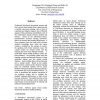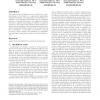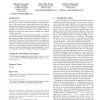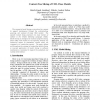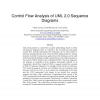43 search results - page 7 / 9 » A Survey of Formal Concept Analysis Support for Software Eng... |
HICSS
2002
IEEE
13 years 12 months ago
2002
IEEE
Traditional Web-based educational systems still have several shortcomings when comparing with a real-life classroom teaching, such as lack of contextual and adaptive support, lack...
AGENTS
2001
Springer
13 years 11 months ago
2001
Springer
The agent-oriented modeling process is divided in a typical sequence of activities, i.e., requirements specification, analysis, and design. The requirements are specified by des...
SAC
2009
ACM
14 years 1 months ago
2009
ACM
In a typical client-server scenario, a trusted server provides valuable services to a client, which runs remotely on an untrusted platform. Of the many security vulnerabilities th...
ICSM
2005
IEEE
14 years 16 days ago
2005
IEEE
In the work presented here, we introduce a method to automatically generate a subset of a UML class model based on a user-defined criterion. The goal of this work is to allow us to...
ECMDAFA
2005
Springer
14 years 14 days ago
2005
Springer
This article presents a control flow analysis methodology based on UML 2.0 sequence diagrams (SD). In contrast to the conventional code-based control flow analysis techniques, thi...
